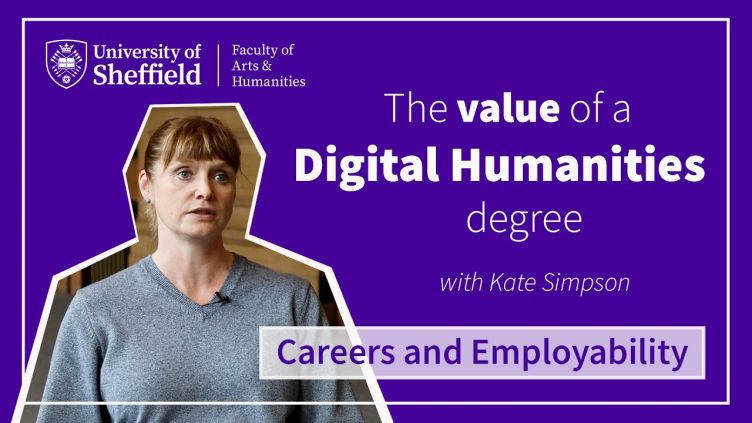Digital Culture and Communication MA
School of History, Philosophy and Digital Humanities,
Faculty of Arts and Humanities
-
Start date
September 2026 -
Duration
1 year 2 years -
Attendance
Full-time Part-time
Explore this course:
Apply now for 2026 entry or join us on a discovery afternoon to see where a Sheffield masters could take you.

Course description
If you have a passion for understanding culture and society and a desire to influence digital innovation, this MA is for you.
It will help you better understand the cultural contexts of digital media developments through historical, critical and theoretical perspectives.
Digital culture is about the emergence and use of digital content, networks and technologies - for example, social media, algorithms, online groups, digital images and sounds - and their interactive relationship with the ways culture is created, consumed and altered.
The nature of digital culture means users don’t just receive it, they interact with it and are influenced by it. For example:
- Whose voices are present or absent online and how that relates to inequality
- How personal and group identities are expressed in the digital world and how this affects identity
- The degree that digital objects emerge from our culture and cause changes to it
You’ll also learn how digital content is used to represent human culture and society in the past and present, such as ancient documents, artefacts and environments as well as present-day social media, digital arts and virtual worlds.
You don't need a background in information science, computer programming or have mathematical competencies. It's far more important for applicants to have an interest in culture and society.
Modules
Core modules:
- Introduction to Digital Culture
-
This module examines the theory and history of the interaction between culture and information and communication technology (ICT). 'Digital culture' refers to culture shaped by the emergence and use of digital technologies, their practices and artefacts. This module focuses on the changes wrought by the widespread adoption of networked computing, personalised technologies and digital images and sound, for the way we think about culture and cultural data, the contexts in which digital culture exists and is made, and their impacts for the creative/cultural industries. You will learn about the characteristics of digital culture including types of cultural forms and experiences, technical processes, and about digital practice and computing as a cultural activity, including its history, socio-cultural context, aesthetics, epistemologies, its ethical problems and critical debates. This will enable you to understand current forms of digital culture, critically contextualise your own and others' digital practice, and anticipate future developments, as appropriate to knowledge-based careers in the cultural sector.
30 credits - Managing Digital Projects
-
This module examines project management in the context of developing data products and digital performances. Data products might be websites, databases, apps, or virtual environments which use cultural content. Digital performances might include music, art, video or digital exhibitions in which the practices and/or the outputs are digital. The module will teach the skills and tools necessary to manage the design, planning and execution of a digital project, including: developing ideas; understanding user requirements; developing specifications for design teams; planning; choosing the best design and development methodology. The module does not require the product or performance to be executed.
30 credits
Plus the below:
- E-Portfolio
Optional and guided modules:
- Heritage, History and Identity
-
This module highlights the diversity of cultural heritage, ranging from cultural and 'natural' landscapes, through monuments to music, dress, cuisine, 'traditional' crafts, and language and dialect. It explores the role of these various forms of heritage in shaping local, regional and national identity; the extent to which they reflect or misrepresent local, regional and national history; the legal and ethical issues surrounding conservation and preservation of heritage; and how study of 'traditional' lifeways may contribute to understanding of history.
15 credits - Wikipedia and History
-
Wikipedia is today probably the world's chief source of historical knowledge. Every day, its pages on history are read by many thousands of people. Yet professional historians tend to avoid engaging with it. This course seeks to change that. As well as discussing critical perspectives on Wikipedia, students will receive practical training in creating or editing a page on a historical topic. They will then apply their studies in a hands-on way to improving the encyclopedia's historical coverage, and reflect on the kind of historical knowledge of the period it promotes and disseminates.
15 credits - Introduction to Cultural Data
-
This module examines cultural data, including methods for creating, analysing and communicating data. Cultural data is digital data about human culture and society, past and present: from ancient documents, artefacts and environments to present-day social media, digital arts and virtual worlds. Cultural data also uses a wide range of digital methods for its creation, analysis and communication, such as digitisation, crowdsourcing, AI, data visualisation, apps, digital exhibitions, and user-centred design. You will learn the principles, methods and tools for working with all types of cultural data, preparing you for a career in the media, information and cultural sectors.
30 credits - Digital History
-
The last 50 years have seen new digital technologies transform the ways in which historical research is conducted, presented and disseminated. This module will introduce you to key digital historical research methods - including digital mapping, social network analysis and data visualisation - and ask you to reflect on the impact these methods have had on the wider discipline of history. You will then get the chance to put some of these methods into practice through a digital history project of your own. Examples and case studies will draw on sources from a range of historical periods, and you will be free to follow your own historical interests in your project. You will leave the module not just with an appreciation of how digital methods can be used to facilitate historical research, but also a set of transferable skills applicable in a range of academic and non-academic settings.
15 credits - Digital Cultural Heritage: Theory and Practice
-
This module examines the theoretical and methodological advances in Digital Cultural Heritage and their broader implications in fields concerned with the interpretation and presentation of the past. We will draw on theoretical readings as well as analyse the potential benefits and drawbacks of certain digital and online approaches. Topics include: principles and theories underlying Digital Cultural Heritage, understanding processes of creating digital surrogates, establishing principles for user experience, and exploring digital narratives for public dissemination. A major component of this module will be a semester-long project that will require the development of a proposal for a digital cultural heritage project.
15 credits - Heritage, Place and Community
-
The aim of this module is to introduce the theory and practice of heritage, conservation and public archaeology. The module will encourage debate on issues that affect how we define and apply the term 'heritage'. It also offers an opportunity to focus on the historic 'value' of a site or landscape, with an evaluation of how it is currently managed, and strategies for its future conservation and presentation.
15 credits - Digital Mapping for the Humanities
-
This module will introduce students to digital mapping as sources, as methods and as outputs for humanities research. Digital mapping offers a wide variety of analytical and interpretive methods that are put to use in many humanities disciplines. Maps and mapping allow us to recognise social constructions of place, visualise patterns, gaps, and changes across time and space. By combining spatial and temporal dimensions into visual representation, digital mapping can provide innovative approaches, methods, techniques, interpretive practices, and solutions to different stages of research, from data collection to science communication. The module will be delivered through both discursive and 'hands-on' classes and will draw on case studies from across the arts and humanities. Students will critically engage and analyse multidisciplinary examples in which digital mapping is a core aspect of research. They will also make use of multiple methods and tools on digital mapping platforms to create, visualise, analyse, disseminate, and communicate spatial and temporal data and knowledge.
15 credits - Digital Methods in Practice
-
This module aims to give students a practical overview of Digital Humanities, a subject which uses data science methods to provide a better understanding of arts, humanities and cultural data for research purposes. Building on the methodological introductions given in the IPA61001 module 'Introduction to Cultural Data', this module will present and discuss actual case studies that exemplify how digital approaches can be used to ask novel and ground-breaking research questions using cultural data. The module includes hands-on sessions where students will learn basic principles of selected digital tools, including text encoding, data visualisation, data analysis and 3D modelling, and be able to complete simple digital projects. Real-life cultural datasets will be used during the hands-on sessions, to give students the opportunity to encounter, and learn to tackle, the most common issues in the application of these technologies in research contexts.
15 credits
Attending this module, students will acquire a more concrete understanding of digital approaches to cultural data, learn how to critically leverage the specificity of the different data formats, and become familiar with current best practices.
This module does not assume any previous knowledge or experience with digital tools. - Designing Cultural Data Products
-
This module examines how cultural data products are designed. Cultural data products might be websites, databases, information services, apps, virtual environments, digital art or digital exhibitions which use cultural content. The module will teach methods, tools and best practices for designing and disseminating cultural data products, including: understanding why good design is important; developing user-led interfaces; understanding how websites, systems, apps and tools are built; user testing; managing IP and data ethics; developing dissemination plans. The module will not teach you how to program in code, and no software programming skills are required. You will have the opportunity to work in groups to invent your own product and develop a user interface and dissemination plan during the module.
15 credits
Plus the below:
- Data and Language Analytics
The content of our courses is reviewed annually to make sure it's up-to-date and relevant. Individual modules are occasionally updated or withdrawn. This is in response to discoveries through our world-leading research; funding changes; professional accreditation requirements; student or employer feedback; outcomes of reviews; and variations in staff or student numbers. In the event of any change we will inform students and take reasonable steps to minimise disruption.
Open days
Interested in postgraduate taught study?
- Join us on a discovery afternoon on Tuesday 10 March or Tuesday 12 May to see where a Sheffield masters could take you
- Register your interest in studying at Sheffield.
Duration
- 1 year full-time
- 2 years part-time
Teaching
This course capitalises on over 25 years of expertise and an international reputation in digital culture at the Faculty of Arts’ Digital Humanities Institute (DHI).
The DHI is the UK’s leading centre for the development, analysis and communication of digital culture and digital humanities. DHI colleagues deliver modules that draw on their knowledge, expertise and track record.
Your career
Our MA programmes are designed to train the next generation of leaders and innovators.
This MA will provide you with the skills and intellectual training to prepare you for a career in creative industries, the cultural heritage sector (including galleries, libraries, archives and museums), and the information, media and communication sectors.
Our MA also provides excellent preparation for doctoral research.
School
School of History, Philosophy and Digital Humanities
In the School of History, Philosophy and Digital Humanities, we interrogate some of the most significant and pressing aspects of human life, offering new perspectives and tackling globally significant issues.
The Digital Humanities Institute is the UK's leading centre for research, development and communication in digital culture and digital humanities.
Established in 1994, our mission is to support the innovative use of technology and computation within arts, humanities and heritage research as both a method of inquiry and a means of dissemination. Digital culture is everywhere, and it is driven by cultural data.
We collaborate with a wide range of academic and research colleagues, as well as professionals in the heritage, culture and information industries, across the UK and internationally on funded projects with a computational component or digital output. Since the DHI was established, we have delivered over 120 externally funded research projects, collaborated with more than 125 external partners, and received grants from 39 funders.
Approximately 50% of all our projects are led by academic or cultural institutions outside the University of Sheffield which means we have a wide network of industry experts and organisations which our students are able to tap into and benefit from through things such as our annual Business Leader talks.
Entry requirements
Minimum 2:1 undergraduate honours degree in any subject.
English language requirements
IELTS 6.5 (with 6 in each component) or University equivalent
Other requirements
If you have any questions about entry requirements, please contact the school.
Fees and funding
Save on your course fees
Apply
You can apply now using our Postgraduate Online Application Form. It's a quick and easy process.
Contact
Any supervisors and research areas listed are indicative and may change before the start of the course.
Recognition of professional qualifications: from 1 January 2021, in order to have any UK professional qualifications recognised for work in an EU country across a number of regulated and other professions you need to apply to the host country for recognition. Read information from the UK government and the EU Regulated Professions Database.


